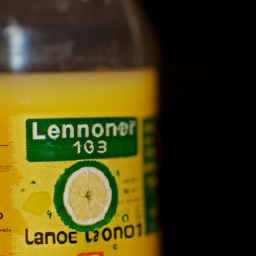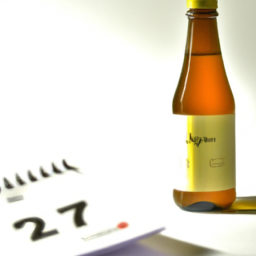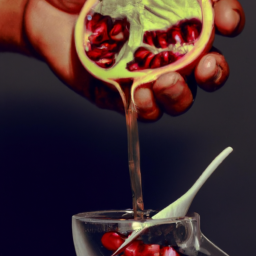I love zapping my food with a sprinkle of zesty taste, so grabbing a **bottle of lemon juice concentrate** from the shelf is my go-to move. Yet, the big question always nags me: How long can this favorite **kitchen buddy** hang around before it turns icky? The last thing I need is nasty lemon juice wrecking my food adventures. Stick around, and you’ll discover how to keep your meals safe and scrumptious.
That’s why I decided to dive into the research and find out the answer to the burning question: how long does concentrated lemon juice last?
First, let’s define what we mean by concentrated lemon juice. Essentially, this is a product made by removing the water from freshly squeezed lemon juice, leaving behind a more potent liquid that can be used for cooking, baking, and flavoring. It’s a convenient option for those who don’t have access to fresh lemons or want a longer shelf life for their lemon juice.
But just how long can we expect this concentrated juice to last? Let’s find out.
Key Takeaways
- Proper storage is crucial to extending the shelf life of concentrated lemon juice.
- Spoilage signs include mold and bacteria growth, exposure to sunlight and air, and contamination from utensils or containers.
- Freezing can extend the shelf life of concentrated lemon juice up to 6 months or more.
- Expired concentrate should be discarded for safety and quality.
What is Concentrated Lemon Juice?
If you’ve ever wondered what concentrated lemon juice is, you’re in the right place! Concentrated lemon juice is simply pure lemon juice that has had the water content removed to create a concentrated form. It is commonly sold in bottles as a convenient alternative to fresh lemons.
Concentrated lemon juice has a variety of uses and benefits. It can be used in cooking and baking to add a tangy flavor to dishes and desserts. It’s also commonly used as a natural cleaning agent due to its acidity, which can help remove stains and disinfect surfaces. Additionally, concentrated lemon juice contains high levels of vitamin C, which can boost the immune system and improve skin health.
Now, let’s move on to the shelf life of concentrated lemon juice.
Shelf Life of Concentrated Lemon Juice
Wow, this zesty elixir sure packs a punch in recipes and can be stored for quite some time. Concentrated lemon juice has a long shelf life, thanks to its high acidity level. When stored properly, it can last up to 6 months in the refrigerator after opening. This makes it a great pantry staple for those who love to cook and bake.
Aside from its long shelf life, concentrated lemon juice also has many uses and benefits. It can be used as a replacement for fresh lemon juice in recipes, as it has a consistent flavor and acidity level. It can also be added to marinades, dressings, and sauces for a tangy kick. Additionally, concentrated lemon juice is a good source of vitamin C and may have some health benefits.
When it comes to storage methods, it’s best to keep concentrated lemon juice in a tightly sealed container in the refrigerator. This will prevent air and moisture from getting in and spoiling the product. It’s also important to check the expiration date before purchasing and using the product.
In the next section, we’ll discuss signs of spoilage to look out for when using concentrated lemon juice.
Signs of Spoilage
To ensure the quality of your concentrated lemon juice, you need to be aware of signs of spoilage that can affect its taste and shelf life. Here are some common contaminants that can spoil your juice and how to properly store it:
- Mold and bacteria can grow in the juice if it’s not stored in a cool and dry place.
- Exposure to sunlight and air can cause the juice to oxidize, turning it brown and affecting its taste.
- Mixing the juice with water or other liquids can introduce bacteria and shorten its shelf life.
- Using a contaminated utensil or container when handling the juice can also lead to spoilage.
- Leaving the juice open and exposed to the environment can attract insects and other pests that can contaminate it.
Proper storage is key to extending the shelf life of your concentrated lemon juice. Store it in an airtight container in the refrigerator or freezer to prevent mold and bacteria growth. Be sure to use clean utensils and containers when handling the juice, and avoid mixing it with other liquids until you’re ready to use it.
With these precautions, your concentrated lemon juice can last for up to a year without spoiling.
Moving on to nutritional value, it’s important to understand the benefits of consuming concentrated lemon juice.
Nutritional Value
Squeezing a lemon into your water not only adds flavor, but also provides a burst of Vitamin C and other nutrients that can improve your overall health. Lemon juice is rich in antioxidants and anti-inflammatory compounds that can boost your immune system, support digestion and promote hydration. It is also low in calories and can be used in a variety of recipes to add a tangy twist to your favorite dishes.
One of the benefits of using concentrated lemon juice is that it can save you time and effort in the kitchen. You don’t have to worry about buying and squeezing fresh lemons every time you need a splash of lemon juice. Concentrated lemon juice is versatile and can be used in marinades, dressings, sauces, and even desserts. You can also mix it with water to make a refreshing lemonade or add it to your tea for an extra zing.
However, it’s important to know how long concentrated lemon juice lasts to avoid spoilage and ensure maximum flavor.
How Long Does Concentrated Lemon Juice Last?
If you’re wondering how to ensure the freshness and flavor of your concentrated lemon juice, it’s important to store it properly and pay attention to the expiration date. Here are some ways to store your concentrated lemon juice to keep it fresh for as long as possible:
-
Refrigerate: Store your concentrated lemon juice in the refrigerator after opening. This will help to slow down the oxidation process and maintain the flavor for a longer time.
-
Freeze: If you want to extend the shelf life of your concentrated lemon juice even further, you can freeze it. Simply pour it into an airtight container and put it in the freezer. Thaw it in the refrigerator before use.
-
Check the expiration date: Always check the expiration date on the bottle before using your concentrated lemon juice. Using it past the expiration date can lead to a loss of flavor and quality.
Using concentrated lemon juice has many benefits, such as being a convenient and cost-effective way to add flavor to your dishes. By following the above ways to store your concentrated lemon juice, you can ensure that it stays fresh and flavorful for longer.
In the next section, we’ll discuss some tips for extending the shelf life of your concentrated lemon juice even further.
Tips for Extending Shelf Life
Extending the shelf life of your concentrated lemon juice is a piece of cake with these simple tips. One way to preserve your lemon juice is to store it in the refrigerator. The cold temperature prevents bacteria growth, keeping your juice fresh for a longer period.
It’s important to ensure that your bottle or container is tightly sealed to prevent any air from entering, as this can cause the juice to spoil quickly. Another technique is to freeze your concentrated lemon juice. Freezing can extend the shelf life up to six months or more.
To do this, pour the juice into an ice cube tray and freeze it. Once frozen, transfer the cubes to a freezer-safe container or bag. When you need to use the juice, simply take out a cube and thaw it. These storing techniques will help you make the most out of your concentrated lemon juice, saving you money and reducing food waste.
When your concentrated lemon juice has expired, there are still ways to use it up. One option is to use it for cleaning purposes, such as removing stains or as a natural disinfectant. Another option is to use it in cooking or baking as a substitute for fresh lemon juice. Just be sure to adjust the amount used as the flavor may be more concentrated.
How to Use Expired Concentrated Lemon Juice
So, you’ve found a bottle of expired concentrated lemon juice lurking in the back of your pantry. Don’t toss it just yet! As someone who hates wasting food, I’ve come up with a few ways to repurpose expired concentrated lemon juice that won’t make you sick.
However, it’s important to know when to discard expired concentrated lemon juice to avoid any potential health risks.
Ways to Repurpose Expired Concentrated Lemon Juice
There are plenty of creative ways to use expired concentrated lemon juice! One of my favorite upcycling ideas is to use it as a natural cleaner. Simply mix equal parts water and lemon juice, and use the solution to clean and disinfect surfaces like countertops, cutting boards, and even bathroom fixtures. The acidity in the lemon juice helps to break down grime and kill bacteria, making it a great alternative to harsh chemical cleaners.
Another creative use for expired concentrated lemon juice is to add it to homemade beauty products. The citric acid in the juice can help exfoliate and brighten skin, making it a great addition to DIY face masks and scrubs. It can also be used as a natural highlighter for hair, by mixing it with water and applying it to strands before going out in the sun. However, it’s important to note that expired lemon juice may not be as effective as fresh juice, so it’s best to use it for non-critical applications like cleaning or beauty treatments.
When it comes to expired concentrated lemon juice, knowing when to discard it is important for both safety and taste. It’s generally recommended to discard any opened lemon juice that has been sitting in the fridge for more than 6 months, or unopened juice that has passed its expiration date. Signs that the juice has gone bad include a sour or off smell, a change in color, or cloudiness.
To ensure the best flavor and quality, it’s always a good idea to use fresh lemon juice whenever possible.
When to Discard Expired Concentrated Lemon Juice
Knowing when to throw away expired concentrated lemon juice is crucial for both safety and taste, but don’t worry – it’s easy to spot when it has gone bad! The signs of spoilage are pretty obvious, and you should never use concentrated lemon juice that has passed its expiration date.
To help you determine if your concentrated lemon juice is still good or not, I’ve put together a table below that outlines the signs of spoilage to look out for. Remember, if you notice any of these signs, it’s time to discard your expired concentrated lemon juice and get a new bottle to ensure the safety and quality of your food and drinks.
| Signs of Spoilage | What to Look For |
|---|---|
| Mold | Black, green, or white growths |
| Off Smell | Sour, rancid, or fermented odor |
| Change in Color | Darker or cloudier than usual |
| Expiration Date | Past the printed date on the bottle |
Now that you know when to discard expired concentrated lemon juice, it’s important to note that this applies to all types of citrus concentrates. In the next section, we’ll explore other types of citrus concentrates and how to properly store and use them.
Other Types of Citrus Concentrates
I want to talk about other types of citrus concentrates and their differences from concentrated lemon juice.
One important aspect to consider is their shelf life, as it varies from one citrus concentrate to another.
Additionally, it’s worth exploring the different uses of these concentrates, as they can be used in a variety of recipes and cooking applications.
Differences Between Concentrated Lemon Juice and Other Citrus Concentrates
Concentrated lemon juice is a unique citrus concentrate that has a distinct flavor profile compared to other citrus concentrates. It has a tart and acidic taste that makes it an ideal ingredient for a wide range of cooking applications. The concentrated form allows for a more concentrated flavor, which makes it a great substitute for fresh lemon juice in recipes that require a stronger citrus taste.
One of the biggest differences between concentrated lemon juice and other citrus concentrates is the flavor. While other citrus concentrates such as orange, lime, and grapefruit have their own distinct tastes, they’re generally sweeter and less acidic than lemon juice. This makes concentrated lemon juice a better option for dishes that require a more sour or tangy flavor.
In addition, concentrated lemon juice is a versatile ingredient that can be used in a variety of dishes, including marinades, dressings, sauces, and desserts. It can also be used as a natural preservative and to add flavor to canned fruits and vegetables.
Speaking of which, let’s talk about the shelf life and uses of other citrus concentrates.
Shelf Life and Uses of Other Citrus Concentrates
If you open a bottle of orange juice concentrate, the sweet and tangy aroma will immediately fill the air, transporting you to a sunny citrus grove. Citrus concentrates, like orange juice concentrate, are popular for their longer shelf life and convenience. They are made by removing water from the juice, leaving behind a concentrated form that can be easily stored and used when needed.
Aside from extending the shelf life of citrus juices, concentrates also offer various benefits and uses. They are often used as an ingredient in cooking and baking, adding a tangy flavor to marinades, dressings, and sauces. Citrus concentrates are also rich in vitamin C and other nutrients, making them a healthy and refreshing addition to smoothies and other beverages. The table below summarizes the shelf life and recommended uses of some popular citrus concentrates:
| Citrus Concentrate | Shelf Life | Recommended Uses |
|---|---|---|
| Orange Juice Concentrate | 12-18 months | Baking, cooking, smoothies |
| Lemon Juice Concentrate | 5 years | Marinades, dressings, sauces |
| Lime Juice Concentrate | 2-3 years | Cocktails, sauces, ceviche |
Overall, citrus concentrates provide a convenient and flavorful way to incorporate citrus into various dishes and drinks. With their longer shelf life and versatility, they are a great addition to any pantry.
Frequently Asked Questions
Can concentrated lemon juice be frozen for long-term storage?
Yes, concentrated lemon juice can be frozen for long-term storage. During the freezing process, transfer the juice into a freezer-safe container and leave some space for expansion. Thaw using gentle methods like refrigeration or running under cool water.
How does concentrated lemon juice compare to freshly squeezed lemon juice in terms of nutritional value?
In terms of nutritional benefits, freshly squeezed lemon juice contains more vitamin C and other nutrients than concentrated lemon juice. Processing methods used to make concentrated lemon juice can strip away some of its natural nutrients.
Can concentrated lemon juice be used as a substitute for fresh lemon juice in recipes?
Using concentrated lemon juice for baking is like having a secret weapon in the kitchen. It’s a great substitute for fresh lemon juice and adds a tangy flavor to marinades. Plus, it has a longer shelf life than fresh lemon juice.
Does the shelf life of concentrated lemon juice differ depending on the brand or packaging?
The shelf life of concentrated lemon juice may vary depending on the packaging. The type of packaging can impact the preservation techniques used to keep the juice fresh.
Can concentrated lemon juice be used for non-culinary purposes, such as cleaning or skincare?
Concentrated lemon juice can be used for cleaning due to its antibacterial properties and acidic nature. It can also be used in skincare as a natural exfoliant to brighten and clarify the complexion.
Conclusion
Well folks, it turns out that concentrated lemon juice can last quite a while if stored properly. Who knew?
As someone who’s thrown away expired condiments more times than I care to admit, I find it ironic that the one thing I thought would go bad quickly has such a long shelf life. But don’t let its longevity fool you, concentrated lemon juice can still spoil if not stored properly or used past its expiration date.
So, while it may seem like a good idea to stock up on this citrus concentrate, it’s important to keep an eye on the expiration date and follow proper storage guidelines to ensure it stays fresh for as long as possible. Cheers to long-lasting lemon juice!









